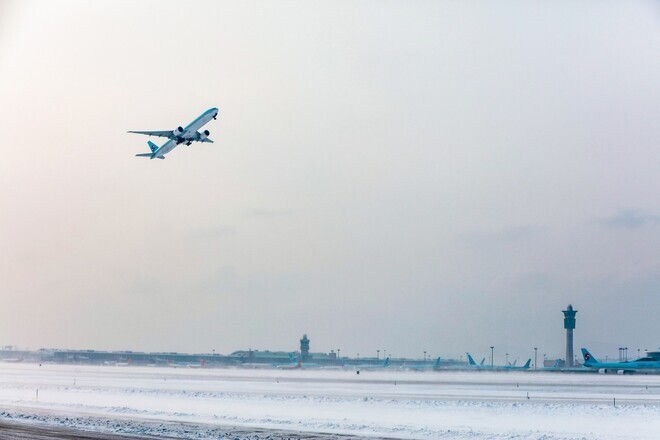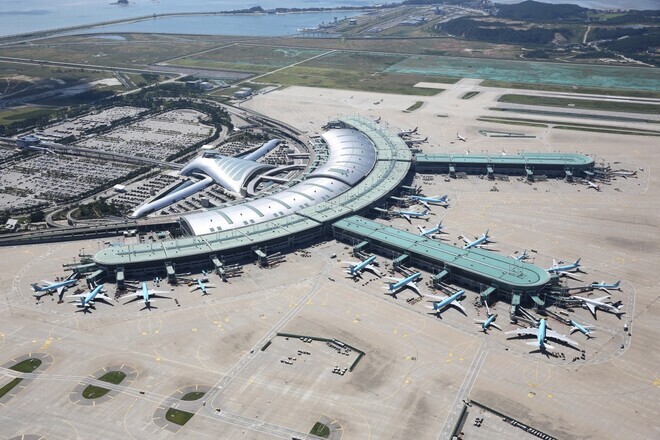hankyoreh
Links to other country sites 다른 나라 사이트 링크
Incheon airport marks 20th anniversary

Incheon International Airport, the “gateway to Korea,” marked its 20th anniversary Monday. Since opening in 2001, it has averaged nearly 10% annual growth, emerging as a global hub airport ranked fifth worldwide for international passengers and third worldwide for international cargo.
Despite facing a crisis with a steep 80% dive in passenger demand amid the global COVID-19 pandemic, it is gearing up for a new step forward as a global airport market leader.
According to accounts Monday from Incheon International Airport Corporation and others, the airport ranked third in the world for international cargo (2.66 million tons per year) and fifth for international passengers (71 million per year) as of 2019, with over 100 airlines providing 255 routes to 73 different countries.
In terms of international passenger numbers, it placed in the top five globally, surpassing Paris Charles de Gaulle Airport in France and Singapore Changi Airport.
Registering a current term net profit three years after its opening, Incheon Airport averaged growth of 8% for the next 16 years. It was also recognized as part of the global elite in terms of airport operation ability and acumen, spending 12 straight years since 2005 at the top of the Airport Service Quality (ASQ) rankings, as assessment of over 1,800 airports worldwide by Airports Council International (ACI).
Based on these results, Incheon Airport has also become a global leader in exporting its operation model to other airports around the world. This has included 30 projects commissioned by 15 countries, including strategic advisory consulting for a new airport in Poland, contracted operation of Terminal 4 at the Kuwait International Airport, and development and operation of Hang Nadim International Airport in Batam, Indonesia.
In terms of dollar value, these orders alone amount to some US$230 million in scale. Once the expansion of its Terminal 2 and construction of its fourth runway are complete by 2024, Incheon Airport will be capable of processing 160 million passengers and 6.3 million tons of cargo annually.

When the global COVID-19 pandemic erupted last year, it left Incheon Airport facing an unprecedented crisis. Passenger traffic plummeted in an “L-shaped” curve, leaving the airport faced with its first deficit since opening, at 426 billion won (US$375 million).
Last year, the airport was used by just 11 million travelers, down 83% from 2019. According to the airport’s predictions, passenger numbers are likely to fall between 5.07 million and 16 million this year, even when vaccinations are taken into account.
An official with the airport explained, “Last year, we provided 1.2 trillion won [US$1.05 billion] in support to all of the airport’s related businesses — including airlines, ground handling and airport tenant businesses — in the form of reductions and deferments of airport facility usage fees.”
“We’re planning to continue offering that support this year, which means the deficit could end up growing,” the official said.
Incheon Airport is now working on devising “airport demand recovery measures” that involve moving away from its existing profit structure, which focuses chiefly on rental fees for commercial facilities and diversifying into other efforts aimed at building the airport industry ecosystem in the surrounding area and exporting the common use passenger processing systems that it has developed.
On Monday, Incheon Airport announced its “Incheon International Airport New Vision 2030+,” in which it pledged to overcome the threat posed by the COVID-19 pandemic and usher the airport industry to a new plateau.
“To respond to the post-coronavirus era and structural changes to the management environment, Incheon Airport will develop the concept of the airport from a space for travel to a space of culture, value and beyond that offers people enjoyment and excitement,” said Incheon International Airport Corporation President Kim Kyung-wook during the announcement.
“Incheon Airport will open up new realms to drive growth over the next 20 years,” he declared.
By Lee Jung-ha, Incheon correspondent
Please direct comments or questions to [english@hani.co.kr]

Editorial・opinion
![[Column] Tariffs on China: Trump was dumb, Biden dumber [Column] Tariffs on China: Trump was dumb, Biden dumber](https://flexible.img.hani.co.kr/flexible/normal/500/300/imgdb/original/2024/0520/191716191153918.jpg) [Column] Tariffs on China: Trump was dumb, Biden dumber
[Column] Tariffs on China: Trump was dumb, Biden dumber![[Column] What if Seoul took reunification by force off the table? [Column] What if Seoul took reunification by force off the table?](https://flexible.img.hani.co.kr/flexible/normal/500/300/imgdb/original/2024/0520/3017161928630494.jpg) [Column] What if Seoul took reunification by force off the table?
[Column] What if Seoul took reunification by force off the table?- [Editorial] Intensifying US-China rivalry means Seoul must address uncertainty with Beijing sooner than later
- [Column] When ‘fairness’ means hate and violence
- [Editorial] Yoon must stop abusing authority to shield himself from investigation
- [Column] US troop withdrawal from Korea could be the Acheson Line all over
- [Column] How to win back readers who’ve turned to YouTube for news
- [Column] Welcome to the president’s pity party
- [Editorial] Korea must respond firmly to Japan’s attempt to usurp Line
- [Editorial] Transfers of prosecutors investigating Korea’s first lady send chilling message
Most viewed articles
- 188% of Chinese firms would rather work with Korean partners than Japanese ones, survey finds
- 2Is growing Korean investment in the US a win-win for both countries?
- 3New doc undoes stereotypes of N. Korea with candid portraits of women’s football legends
- 4To weigh costs and benefits, Korea must stop treating US troop presence as a sacred cow
- 53 months into doctors strike, finding an emergency room in Korea is harder than ever
- 6Kim Jong-un wanted to meet with residents of shelled Yeonpyeong Island in South, Moon recalls in mem
- 7[Column] What if Seoul took reunification by force off the table?
- 8Unification minister says trusting intent of N. Korea could lead to ‘miscalculation,’ criticizing Mo
- 9[Column] Tariffs on China: Trump was dumb, Biden dumber
- 10Video evidence surfaces showing Korean comfort women were massacred by Japanese military